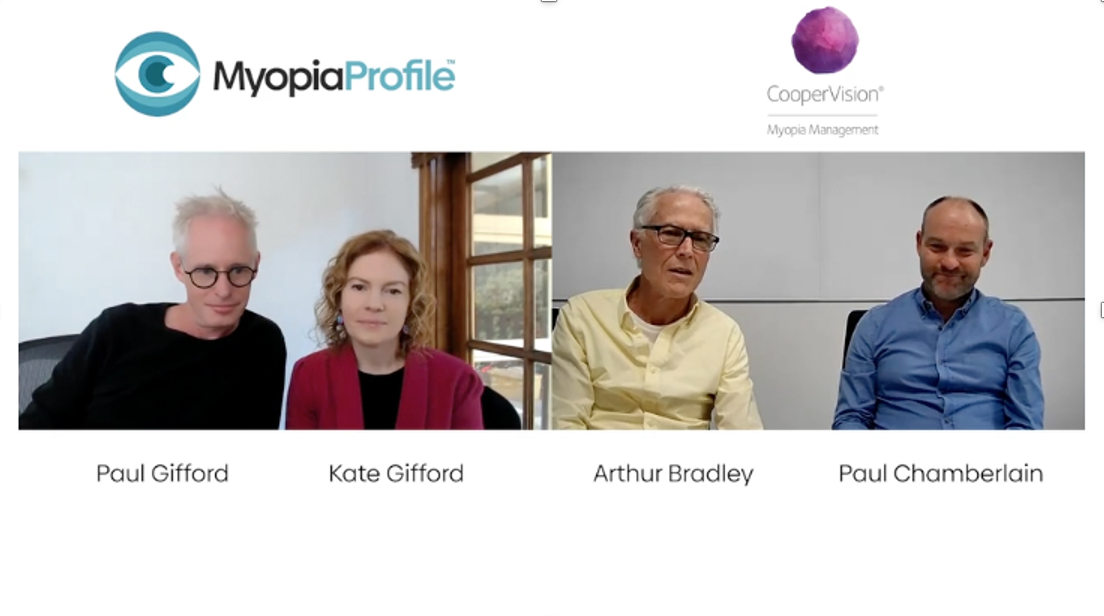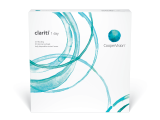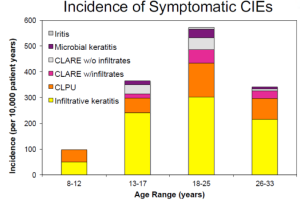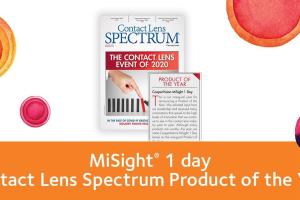The seminal study details were recently published in Ophthalmic and Physiological Optics, affirming CooperVision’s myopia control leadership.
A new peer-reviewed paper has further validated the myopia control efficacy of CooperVision’s innovative MiSight® 1 day contact lenses. Published in Ophthalmic and Physiological Optics, the journal of the UK College of Optometrists, Six-Year Cumulative Treatment Effect and Treatment Efficacy of a Dual Focus Myopia Control Contact Lens (Chamberlain P, et al) details findings and insights from the groundbreaking study—the longest investigation of its kind.1 The paper is available via open access at https://doi.org/10.1111/opo.13240.1
In addition, the company has released a companion video interview with two of the paper’s co-authors and CooperVision R&D leaders: Senior Director of Research Programs Paul Chamberlain, BSc (Hons) and Research Fellow Arthur Bradley, PhD. Hosted by Myopia Profile’s Kate Gifford, PhD and Paul Gifford, PhD, it describes the study methodologies, outcomes, and clinical applications. The video can be viewed at Myopia Profile.
“We remain committed to provide eye care professionals with high quality evidence to answer important questions on the long-term impact of myopia control with MiSight® 1 day,” said Chamberlain of CooperVision. “The rigorous, multi-center study design, unequaled investigation timeframe, and clear outcomes have strengthened prescribing confidence for this unique, effective optical intervention to slow the progression of myopia.†‡2,3 This publication will further reinforce those evidence-based behaviors, as the global eye care community collectively addresses the childhood myopia epidemic.”
The paper describes that in the absence of a second phase control group for ethical reasons, prior myopia progression, emmetropic eye growth, and delay in time to progress analysis methods can be used to estimate myopia control efficacy. MiSight® 1 day slowed eye growth to less than half that observed in untreated children, paralleling modelled rates of emmetropic eye growth.1 Moreover, when myopic children begin treatment with MiSight® 1 day between the ages of 8-12, the probability of > 0.3mm eye growth occurring within one to three years decreased by 95%.1
The paper also confirms the value of pursuing myopia control treatment for children as young as 8 years old using MiSight® 1 day. Early intervention provides opportunity for greater myopia control potential, which may help reduce reliance on vision correction, limit changes in prescriptions between appointment visits in support of developmental and educational milestones, lessening myopia’s impact on future ocular health.2,4,5
Now prescribed in more than 30 countries, CooperVision’s MiSight® 1 day is the first and only soft contact lens approved by the FDA* to both correct vision and slow the progression of myopia in children aged 8-12 at the initiation of treatment.†2 Additionally, it was the first Chinese NMPA-approved soft contact lens with an indication relating to slowing the progression of axial length in patients who at initiation are 8-12 years old and have a refraction of -0.75 D to -4.00 D with ≤ 0.75 diopters of astigmatism.§ The company also offers a range of orthokeratology contact lens designs for myopia management.

* U.S. Indications for Use: MiSight® 1 day (omafilcon A) soft (hydrophilic) contact lenses for daily wear are indicated for the correction of myopic ametropia and for slowing the progression of myopia in children with non-diseased eyes, who at the initiation of treatment are 8-12 years of age and have a refraction of -0.75 to -4.00 diopters (spherical equivalent) with ≤ 0.75 diopters of astigmatism. The lens is to be discarded after each removal.
§ China Indications for Use: MiSight® 1 day is indicated for the correction of myopia for patients with non-diseased phakic eyes, who at the initiation of treatment are 8-12 years of age and have a refraction of -0.75 D to -4.00 D with ≤ 0.75 diopters of astigmatism. It has the dual focal design with alternative multiple rings, which allows part of the light passing through the optical zone to focus in front of the retina, forming myopic defocus with the expectation to slow the change of axial length of the patients. Fitting and evaluation of the product should be in medical institutions by ophthalmologists with an intermediate title or above and with regular monitoring. It must be used in strict accordance with the IFU requirements.
† Compared to a single vision 1 day lens over a 3-year period.
‡ 64% strongly agree, 26% somewhat agree.
1. Chamberlain, P, Hammond, DS, Arumugam, B, Bradley, A. Six-year cumulative treatment effect and treatment efficacy of a dual focus myopia control contact lens. Ophthalmic Physiol Opt. 2023; 00: 1–7. https://doi.org/10.1111/opo.13240.
2. Chamberlain P, et al. A 3-year randomized clinical trial of MiSight® lenses for myopia control. Optom Vis Sci. 2019; 96(8):556-567.
3. CVI data on file 2022. U.S. CooperVision online survey: ECP MiSight® 1 day Perspectives; n=101 ECPs that prescribe MiSight® 1 day.
4. Chamberlain P et al. Long-Term Effect of Dual-Focus Contact Lenses on Myopia Progression in Children: A 6-year Multicenter Clinical Trial. Optom Vis Sci 2022 In Press.
5. Tideman JW et al. Association of axial length with risk of uncorrectable visual impairment for Europeans with myopia. JAMA Ophthalmol. 2016;134:1355-1363








